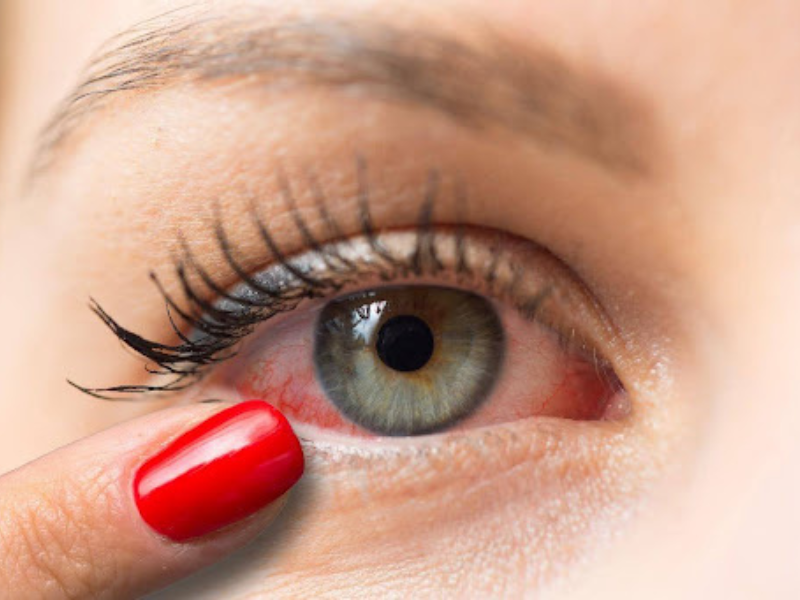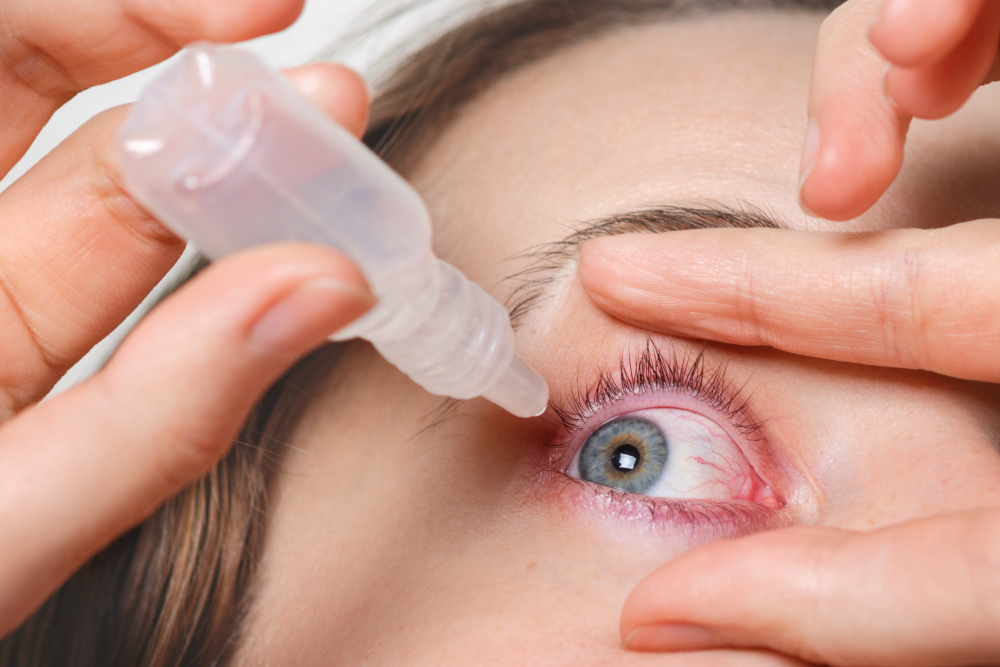
Understanding the Link Between Menopause and Dry Eyes
Menopause is a natural phase in a woman’s biological sphere, but it regularly brings about a sequence of discomfort with certain symptoms that can affect their everyday activities. One such frequently unnoticed hassle is dry eyes during menopause. There are some other symptoms of menopause such as hot flashes, mood swings, and joint aches are more typically common symptoms.
Menopause and dry eyes can impact a woman’s quality of life, because of the irritation it causes to the eyes. Through this blog, you will get to know how hormonal changes during menopause lead to dry eyes. We will also discover remedies for dry eyes during menopause to help control these symptoms.
What Causes Menopause Dry Eyes?
Dry eye menopause is generally caused by hormonal fluctuations. Estrogen and progesterone, which modify numerous features in a woman’s body, decline drastically during this transitory period. These hormones are crucial for reproductive health and play a giant role in retaining moisture in the eyes.
1. Hormonal Imbalance
As estrogen and progesterone levels decline, the glands that produce tears (meibomian glands) do not function accurately. This decrease in tear production gradually leads to dry eyes and a feeling of discomfort. The uneasiness in the eyes is experienced in cases that require prolonged attention and focus, such as reading books, newspapers, or using a computer.
2. Aging
Getting older contributes to dryness in numerous body parts, which include the eyes as well. The amalgamation of aging and menopause at times worsens the situation, leading to dry eye menopause which is becoming a common issue.
3. Environmental Aspects
There are external factors as well that contribute to dryness of the eyes such as air conditioning, and long hours of screen time.
Symptoms of Menopause Dry Eyes
Women going through menopause may additionally experience various signs of dry eyes. Identifying those symptoms can help in the search for early remedies:
1. Itchy Eyes
A persistent feeling of itchiness can be the first sign of menopause dry eyes, causing discomfort in the eyes.
2. Burning Sensation
Many women complain about a burning or stinging sensation, mainly after long periods of exposure to digital screens or reading.
3. Blurred Vision
Reduced tear production can affect vision clarity, gradually leading to intermittent blurred vision.
4. Light Sensitivity
Women with dry eyes and menopause would possibly experience increased sensitivity to light, making it uncomfortable in a brightly lit atmosphere.
5. Redness
Blood vessels in the eyes might get so prominent, that the redness gets visible.
How do Hormonal Changes in Menopause Affect Eye Health?
The link between menopause and eye problems stems from a difficult balance that hormones maintain within a female’s body. Estrogen, mainly, has an instant impact on the tear-generating glands in the eyes. With the decrease in the estrogen level during menopause, these glands become less efficient in retaining the lubrication of your eyes.
Moreover, there are various other conditions found in menopausal females, like autoimmune disorders such as Sjögren’s syndrome, which can exacerbate dry eye menopause. This situation especially targets moisture-producing glands, including those in the eyes intensifying the signs.
Menopause and eye problems don’t just pause only dry eyes. The chance of developing different eye-associated problems including cataracts, glaucoma, and macular degeneration gradually increases during the menopausal phase. Hence, addressing dry eyes early on is critical for retaining overall eye health during this course of time.
Remedies for Dry Eyes Menopause
Now that we have comprehended the causes and signs of menopause dry eyes, let’s study a few effective remedies for dry eyes menopause. These treatments can eliminate discomfort and guard your eyes from any further problems.

1. Use Artificial Tears or Eye Drops
Artificial tears are the easiest solution to eliminate dry eyes. Buy over-the-counter lubricating eye drops can help refill moisture and bring you relief from dryness. Try for preservative-free options in case you plan to use them regularly.
2. Stay Hydrated
One of the natural remedies for dry eyes menopause is to increase your fluid consumption. Drinking lots of water can help you maintain your eye health as well as keep your body hydrated, which helps in retaining the moisture of the eyes.
3. Have a Healthy Diet
Start consuming food that is rich in omega-3 fatty acids, as it can enhance tear production and evade dry eyes. Meals like salmon, flaxseed, walnuts, and chia seeds are the best sources of omega-3s. It should be included in everyday meals.
4. Use a Humidifier
Dry air is worse for dry eyes, especially if you spend maximum of your time indoors, using a humidifier adds moisture to the air, making it easier to keep your eyes hydrated.
5. Reduce Your Screen Time
Spending too much screen time is one of the biggest problems in making your eyes dry and lose its moisture. Ensure taking frequent breaks, practice the 20-20-20 rule (every 20 mins, look at something 20 feet away for 20 seconds), and blink often to maintain the moisture of your eyes.
6. Wear Your Sun Shades
Sunglasses not only protect your eyes from dangerous UV rays but also defend them from wind and dry air, each of which can make your eyes worse. Choose the wrap-round shades for optimum protection.
7. Warm Compress
Applying a warm compress to your eyes can help release the meibomian glands, growing tear generation and relieving signs of dry eyes menopause.
8. Consult an Expert
If your symptoms tend to get persistent and severe, you must consult an eye specialist. They might suggest remedies like punctual plugs, which block tear drainage for retaining moisture within the eyes, or prescribe medicated eye drops daily to treat the underlying infection (if any).
Menopause and Eye Problems: More than Just Dry Eyes
Beyond menopause dry eyes there are certain eye problems, which cause equal amounts of discomfort and pain. Such as:
1. Cataracts
Women are more likely to develop cataracts after menopause because of the oxidative stress on the eye’s lens.
2. Glaucoma
Changes in estrogen levels may also increase the risk of growing glaucoma, a circumstance which could cause blindness if not treated properly.
3. Macular Degeneration
Decreased estrogen levels also can cause age-related macular degeneration (AMD), one of the main causes of vision impairment in older adults.
It is essential to supervise your eye health and get checkups with an ophthalmologist at regular intervals, mainly during menopause, to identify any issues beforehand.
Lifestyle Changes That You Need To Adopt To Avoid Dry Eyes Menopause
Adopting lifestyle changes can help you avoid and manage dry eyes menopause. Here are a few tips for adopting the changes in your lifestyle for a better quality of life:

1. Reduce Alcohol and Caffeine Consumption
Both alcohol and caffeine are diuretics and they can dehydrate your body, including your eyes. Hence, limiting the intake might help restore the moisture of your eyes.
2. Get Lots of Sleep
Not having adequate quantities of sleep can cause terrible tear production. You must make sure that you get at least 7-8 hours of peaceful sleep every night which will help you cure your eye problems.
3. Quit Smoking
Smoking can exacerbate menopause and dry eyes and increase the risk of introducing other eye-associated issues, such as cataracts and macular degeneration.
Key Takeaways
Menopause dry eyes are closely related, and the symptoms at times get too frustrating for women who are already going through numerous other menopausal transitions. However, with appropriate remedies for dry eyes during menopause, these symptoms can be controlled correctly.
Through lifestyle changes like increasing water consumption and using tear drops to more specialized and advanced treatments from an eye specialist, there are a lot of methods that can be adopted to avoid menopause dry eyes. Yet, if you are experiencing severe menopause, dry eyes or even other signs of eye problems then get them checked and adopt the necessary measures required.
Citations
- https://www.dryeyecare.net/whats-the-link-between-dry-eye-and-menopause/
- https://www.ncbi.nlm.nih.gov/pmc/articles/PMC9834459/
- https://www.medicalnewstoday.com/articles/dry-eyes-with-menopause
- https://www.nwhjournal.org/article/S1751-4851(18)30234-4/fulltext
- https://journals.lww.com/jomh/fulltext/2017/08020/dry_eye_syndrome_in_menopause_and_perimenopausal.1.aspx

Prativa Chatterjee





